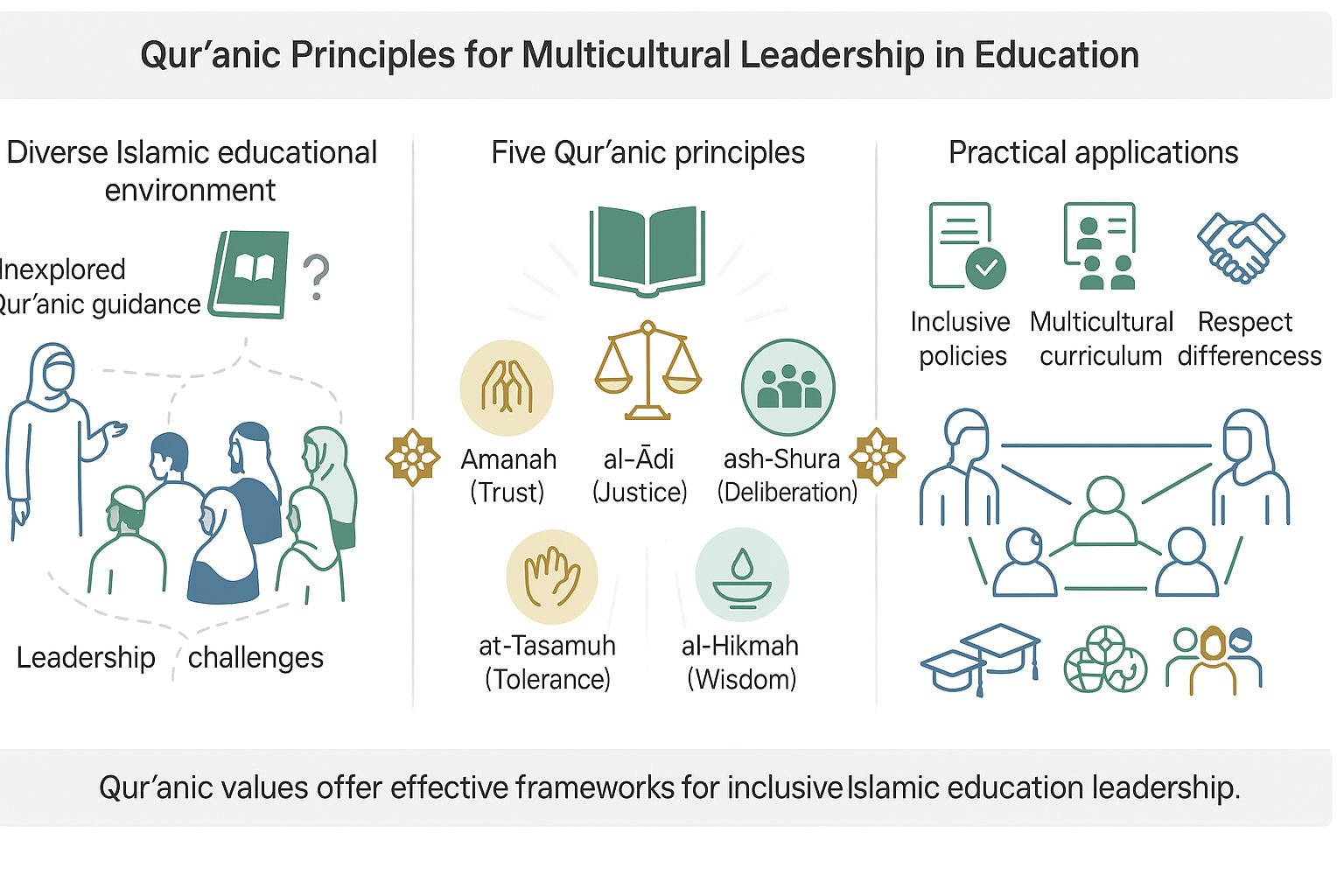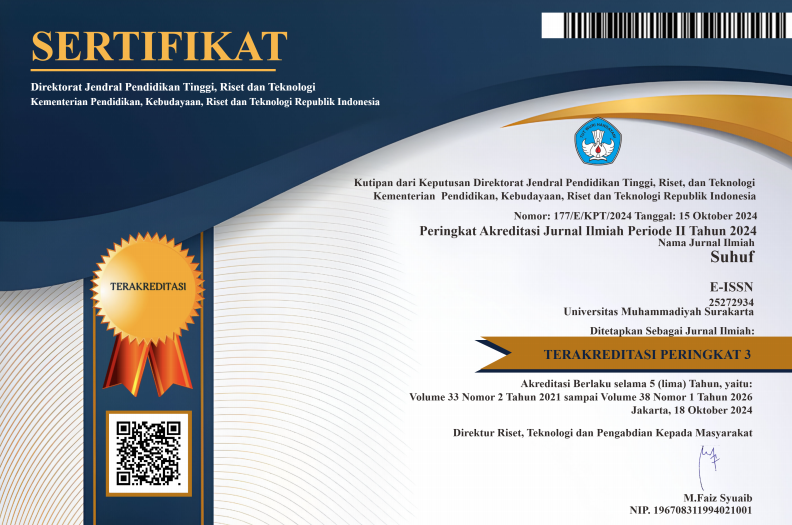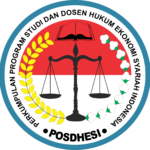Research Trends on the Integration of Science and Character Education: A Bibliometric Analysis Review
DOI:
https://doi.org/10.23917/suhuf.v37i1.10022Keywords:
Bibliometric analysis, Science and technology, Moral crisis , Islamic educational institutions, Educational dilemmaAbstract
Research on multicultural leadership has not systematically referred to the principles of the Qur'an in the context of Islamic education. This research aims to examine the principles of leadership in multicultural Islamic education based on the perspective of the Qur'an, focusing on universal values that support harmonization in a pluralistic educational environment. The research method used is qualitative with a library research approach, where data is collected through an in-depth study of Qur'anic verses, classical and contemporary interpretations, and literature related to multicultural leadership and education. The results of this study show that the Qur'an establishes five main principles of leadership in multicultural Islamic education: Amanah, al-'is (justice), ash-shura (deliberation), at-tasamuh (tolerance), and al-hikmah (wisdom). These principles are theoretical and can be implemented in practice through inclusive policies, the development of multicultural-based curricula, and the fostering of respect for differences among learners. This study concludes that integrating Qur'anic values in Islamic education leadership can be an effective solution to create an environment that is harmonious, equitable, and responsive to diversity. Practical recommendations include multicultural leadership training for educators and strengthening collaboration between educational institutions to promote unity in diversity. These findings contribute to a theoretical model of Islamic educational leadership based on Qur'anic values integrated with modern multiculturalism.
Downloads
References
[1] M. Ilham and F. Rahman, “Character Education of Local Wisdom-based: A Study of Moral Aspect of Quotes belong to Bugis People,” J. Ecohumanism, vol. 3, no. 3, pp. 1125–1140, 2024, doi: https://www.ceeol.com/search/article-detail?id=1277970.
[2] M. Murjazin, A. Nurhuda, L. Susanti, and Y. S. Azami, “Psychological and Physiological Motives in Humans (Study on Verses of The Qur’an),” Suhuf Int. J. Islam. Stud., vol. 35, no. 1, pp. 30–44, 2023, doi: https://doi.org/10.23917/suhuf.v35i1.22581.
[3] F. Arfan, A. Nirwana, M. Fuadi, N. Fadli, and A. S. Ana, “Contribution of Ali Hasjmy’s Legacy of Thought to Aceh Islamic Education,” Suhuf Int. J. Islam. Stud., vol. 36, no. 2, pp. 183–199, 2024, doi: https://doi.org/10.23917/suhuf.v36i2.4764.
[4] A. K. Amrullah, “Keutamaan Ilmu Dan Adab Dalam Persefektif Islam [The Virtue of Knowledge and Manners from an Islamic Perspective],” At-Ta’lim J. Kaji. Pendidik. Agama Islam, vol. 2, no. 1, pp. 33–46, (in Indonesia), 2020, [Online]. Available: https://ejournal.an-nadwah.ac.id/index.php/Attalim/article/view/133
[5] L. Z. Adhito, H. B. Santoso, and K. Junus, “Development and Evaluation of M-Learning Application for Learning the Foundation of Islamic Knowledge,” in 2020 International Conference on Advanced Computer Science and Information Systems (ICACSIS), IEEE, 2020, pp. 447–456. doi: https://doi.org/10.1109/ICACSIS51025.2020.9263152.
[6] J. Aslam, A. Saleem, N. T. Khan, and Y. B. Kim, “Factors Influencing Blockchain Adoption in Supply Chain Management Practices: A Study Based on the Oil Industry,” J. Innov. Knowl., vol. 6, no. 2, pp. 124–134, 2021, doi: https://doi.org/10.1016/j.jik.2021.01.002.
[7] R. N. N. Azizah, “Hadist Pentingnya Menuntut Ilmu: Motivasi dan Manfaatnya [The Importance of Seeking Knowledge in Hadith: Motivation and Its Benefits],” Tabsyir J. Dakwah Dan Sos. Hum., vol. 5, no. 4, pp. 34–42, (in Indonesia), 2024, doi: https://doi.org/10.59059/tabsyir.v5i3.1562.
[8] Z. Mardiya and A. R. Sofa, “Keutamaan menuntut ilmu dalam perspektif Islam di kehidupan modern: Tantangan, peluang, dan pengaruh teknologi dalam pembentukan karakter di era digital [The Virtue of Seeking Knowledge in Islam in Modern Life: Challenges, Opportunities, and the Influence,” Inspirasi Dunia J. Ris. Pendidik. Dan Bhs., vol. 4, no. 1, pp. 13–26, (in Indonesia), 2025, doi: https://doi.org/10.58192/insdun.v4i1.2774.
[9] P. Dangaiso, D. C. Jaravaza, and P. Mukucha, “Evaluating the predictors of mobile health acceptance among Zimbabwean university students during the COVID-19 era: an integrated framework,” Cogent Soc. Sci., vol. 10, no. 1, pp. 1–17, 2024, doi: https://doi.org/10.1080/23311886.2023.2299141.
[10] V. Y. Erviana, “Penanganan dekadensi moral melalui penerapan karakter cinta damai dan nasionalisme [Addressing Moral Decline Through the Implementation of Peace-Loving Character and Nationalism],” J. Penelit. Ilmu Pendidik., vol. 14, no. 1, pp. 1–9, (in Indonesia), 2021, doi: https://doi.org/10.21831/jpipfip.v14i1.27149.
[11] Y. Tira, I. Suwandi, and M. Rifki, “Pendidikan Karakter Siswa Sekolah Dasar dalam Perspektif Islam [Character Education for Elementary School Students from an Islamic Perspective],” Murid J. Pemikir. Mhs. Agama Islam, vol. 2, no. 1, pp. 1–12, (in Indonesia), 2024, [Online]. Available: https://ejournal.stai-mifda.ac.id/index.php/buhun/article/view/532
[12] S. W. Utami, “Penerapan Pendidikan Karakter Melalui Kegiatan Kedisiplinan Siswa [The Implementation of Character Education Through Student Discipline Activities],” J. Pendidik., vol. 4, no. 1, pp. 63–66, (in Indonesia), 2019, doi: https://doi.org/10.26740/jp.v4n1.p63-66.
[13] M. Mery, M. Martono, S. Halidjah, and A. Hartoyo, “Sinergi Peserta Didik dalam Proyek Penguatan Profil Pelajar Pancasila [Student Synergy in the Project to Strengthen the Profile of Pancasila Students],” J. Basicedu, vol. 6, no. 5, pp. 7840–7849, (in Indonesia), 2022, doi: https://doi.org/10.31004/basicedu.v6i5.3617.
[14] M. N. Huda, M. Duwila, and R. Rohmadi, “Menantang Disintegrasi Moral di Era Revolusi Industri 4.0: Peran Revolusioner Pondok Pesantren [Challenging Moral Disintegration in the Era of the Industrial Revolution 4.0: The Revolutionary Role of Islamic Boarding Schools (Pondok Pesantren)],” J. Islam. Educ., vol. 9, no. 1, pp. 1–13, (in Indonesia), 2023, doi: https://doi.org/10.18860/jie.v9i1.22805.
[15] F. Mansir, S. Jamaluddin, M. Ikhsan, B. Wadham, A. Salim, and J. Inayah, “Integration of Science and Islamic Education Towards The Building of Student Character,” in Conference: Proceedings of the 5th International Graduate Conference in Islam and Interdisciplinary Studies, Lombok, 2023, pp. 1–7. doi: http://dx.doi.org/10.4108/eai.19-10-2022.2329025.
[16] M. H. Shafwan and R. I. Syah, “The Integration Model of Islam and Science Learning in Islamic Education and Character Building at SMK Muhammadiyah 8 Paciran,” Ar-Fachruddin J. Islam. Educ., vol. 1, no. 1, pp. 33–44, 2024, doi: https://doi.org/10.7401/bw4ynr09.
[17] H. S. Batubara, M. Giatman, W. Simatupang, and R. Watrianthos, “Pemetaan Bibliometrik Terhadap Riset pada Sekolah Menengah Kejuruan Menggunakan VOSviewer [Bibliometric Mapping of Research on Vocational High Schools Using VOSviewer],” Edukatif J. Ilmu Pendidik., vol. 4, no. 1, pp. 233–239, (in Indonesia), 2021, doi: https://doi.org/10.31004/edukatif.v4i1.1818.
[18] A. A. S. Huda and F. Fahrudin, “Bibliometric Analysis of School Religious Activities in Developing Students’ Morality in Indonesia,” J. At-Tarbiyat J. Pendidik. Islam, vol. 7, no. 1, 2024, doi: https://doi.org/10.37758/jat.v7i1.790.
[19] A. Karim and J. Soebagyo, “Pemetaan Bibliometrik Terhadap Trend Riset Matematika Terapan Di Google Scolar Menggunakan Vosviewer [Bibliometric Mapping of Research Trends in Applied Mathematics on Google Scholar Using VOSviewer],” Teorema Teor. Dan Ris. Mat., vol. 6, no. 2, pp. 234–241, (in Indonesia), 2021, doi: http://dx.doi.org/10.25157/teorema.v6i2.5835.
[20] E. Wahyudi, “Implementasi E-Journal berbasis Open Journal System (OJS) untuk Meningkatkan Jumlah Publikasi Penelitian Dosen IPDN Kampus NTB [Implementation of E-Journal Based on Open Journal System (OJS) to Increase the Number of Research Publications by IPDN NTB Camp,” Explore, vol. 14, no. 1, pp. 35–41, (in Indonesia), 2024, doi: https://doi.org/10.35200/ex.v14i1.110.
[21] W.-L. Hsu, S. Andri Dayarana K., E. Ixora Javanisa, and D. T. T. and Phuong, “Fostering creativity and performance through authentic leadership in educational institutions,” Cogent Soc. Sci., vol. 10, no. 1, pp. 1–17, Dec. 2024, doi: https://doi.org/10.1080/23311886.2024.2425774.
[22] M. Kautsar and S. Julaiha, “Langkah-langkah Manajemen Strategik di Lembaga Pendidikan Islam [Strategic Management Steps in Islamic Educational Institutions],” J. Instr. Dev. Res., vol. 3, no. 1, pp. 24–28, (in Indonesia), 2023, doi: https://doi.org/10.53621/jider.v3i1.203.
[23] C. Iwan Hermawan, “Konsep Membangun Branding Image untuk Meningkatkan Kepercayaan terhadap Lembaga Pendidikan Islam [The Concept of Building a Branding Image to Increase Trust in Islamic Educational Institutions,” ASCENT Al-Bahjah J. Islam. Educ. Manag., vol. 2, no. 1, pp. 12–26, (in Indonesia), 2024, doi: https://dx.doi.org/10.61553/ascent.v2i1.96.
[24] R. A. Gusli, Z. Sesmiarni, M. Akhyar, and K. M. Lestari, “Pendekatan Efektif dalam Pengelolaan Sumber Daya Manusia di Lembaga Pendidikan Islam [Effective Approaches in Human Resource Management at Islamic Educational Institutions],” Dirasah J. Stud. Ilmu Dan Manaj. Pendidik. Islam, vol. 7, no. 2, pp. 477–488, 2024, doi: https://doi.org/10.58401/dirasah.v7i2.1324, (in Indonesia).
[25] U. Nasution, “Integrasi Pemikiran Imam Al-Ghazali & Ivan Pavlov Dalam Membentuk Prilaku Peserta Didik [The Integration of Imam Al-Ghazali’s and Ivan Pavlov’s Thought in Shaping Student Behavior],” Insa. J. Pemikir. Altern. Kependidikan, vol. 25, no. 1, pp. 103–113, (in Indonesia), 2020, doi: https://doi.org/10.24090/insania.v25i1.3651.
[26] M. Husni, “Kearifan Lokal Handep Masyarakat Dayak: Perspektif Cendekiawan Muslim Dayak di IAIN Palangkaraya Raya [Local Wisdom of Handep in Dayak Society: The Perspective of Dayak Muslim Scholars at IAIN Palangkaraya],” Rihlah J. Sej. dan Kebud., vol. 8, no. 2, pp. 113–133, (in Indonesia), 2020, doi: https://doi.org/10.24252/rihlah.v8i2.15941.
[27] M. R. Baharuddin, “Adaptasi Kurikulum Merdeka Belajar Kampus Merdeka (Fokus: Model MBKM Program Studi) [Adaptation of the Merdeka Belajar Curriculum in the Merdeka Campus (Focus: MBKM Study Program Model)],” J. Stud. guru dan pembelajaran, vol. 4, no. 1, pp. 195–205, (in Indonesia), 2021, doi: https://doi.org/10.30605/jsgp.4.1.2021.591.
[28] N. H. Fitri Mulyani, “Analisis perkembangan ilmu pengetahuan dan teknologi (IPTEK) dalam pendidikan [Analysis of the Development of Science and Technology (S&T) in Education],” J. Pendidik. Dan Konseling. J. Pendidik. Dan Konseling, vol. 3, no. 1, pp. 101–109, (in Indonesia), 2021, doi: https://doi.org/10.31004/jpdk.v3i1.1432.
[29] E. Syahputra, “Pembelajaran abad 21 dan penerapannya di Indonesia [21st Century Learning and Its Implementation in Indonesia],” J. Inf. Syst. Educ. Dev., vol. 2, no. 4, pp. 10–13, (in Indonesia), 2024, doi: https://doi.org/10.62386/jised.v2i4.104.
[30] W. Wardani and T. W. Mahfuzh, “Hijrah Among the Youth: Religious Conversion and Modes of Understanding of Related Qur’ānic Verses,” Khazanah J. Stud. Islam dan Hum., vol. 22, no. 1, pp. 47–73, 2024, doi: https://doi.org/10.18592/khazanah.v22i1.13735.

Downloads
Submitted
Accepted
Published
How to Cite
Issue
Section
License
Copyright (c) 2025 H Hamdi, Ahmad Riduan, Puspita Ais Anggraini , Luqman Baehaqi , Abdul Syahid , Ali Anhar Syi’bul Huda , M Mualimin

This work is licensed under a Creative Commons Attribution 4.0 International License.


















